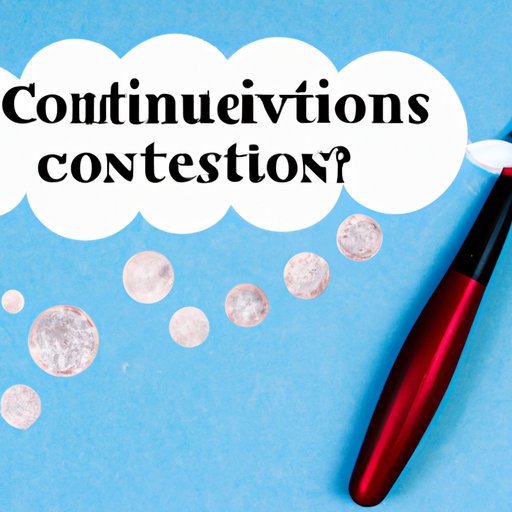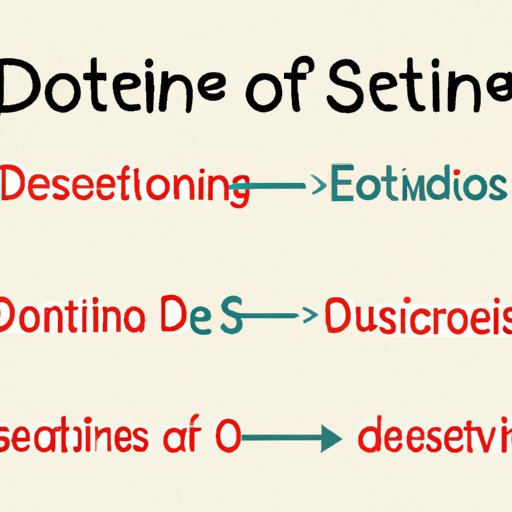Introduction
As the old adage goes, first impressions matter – but it’s important not to forget about the lasting impression you’ll make on a reader. This is where the conclusion of an article or essay comes in. A well-crafted conclusion can be the difference between a piece that sticks with readers long after they’ve finished it and one that is quickly forgotten. In this article, we’ll explore various strategies, dos and don’ts, and the psychological principles behind persuasive writing necessary for writing an effective conclusion. We’ll also share tips and examples for writing conclusions that leave a lasting impression.
6 Proven Tips for Crafting an Effective Conclusion
The following strategies will help you craft a conclusion that is both effective and memorable:
- Summarize key points: Think of the conclusion as a way to tie the entire piece together. One way to do this is to briefly summarize the main points or arguments of the article or essay. This helps the reader connect the dots and understand the piece as a cohesive whole. For example, in an article about the benefits of meditation, you might summarize how meditation can reduce stress, improve focus, and enhance overall well-being.
- Offer a call to action: In some cases, you might want your conclusion to inspire readers to take a specific course of action. This could be something as simple as encouraging them to try a new recipe you’ve shared, or it could be a more serious call to action like urging readers to get involved in a political campaign. Whatever the goal, be clear and specific about what you want readers to do.
- Use a metaphor or analogy: A well-crafted metaphor or analogy can help bring an abstract topic to life. If you can find a comparison that resonates with readers, it will help solidify your message and leave a lasting impression. For example, in an article about the importance of perseverance, you might compare life to a marathon, noting that it’s often the small, steady steps that make the biggest impact in the long run.
- Use a memorable quote: Just like a good metaphor or analogy, a quote from a well-known figure can help reinforce your message and add credibility to your piece. Make sure the quote you choose is relevant, interesting, and memorable. You might even consider weaving the quote into your conclusion in a way that ties it to your own message.
- Add an anecdote: Personal stories and anecdotes can be powerful tools for connecting with readers. If you have a relevant personal experience that ties into your message, consider sharing it in your conclusion. Be sure to keep the story concise and focused, and make it clear how it connects to the larger theme of your article or essay.
- Highlight the impact: Finally, consider ending your conclusion by highlighting the impact of your message or argument. If you can show readers how your article or essay will make a difference in their lives, it will leave a powerful impact. This could be as simple as noting how a particular tip or piece of advice will save time or money, or as profound as highlighting the importance of taking action on a social issue.
The Dos and Don’ts of Writing a Conclusion
While there’s no one-size-fits-all approach to writing a conclusion, there are some best practices and common mistakes to keep in mind:
- Do: Tie the conclusion back to the introduction and main points of the piece.
- Do: Consider the emotional impact of your conclusion – it’s often what readers will remember most.
- Do: Be clear and concise – your conclusion shouldn’t introduce new information or arguments.
- Don’t: Use cliches or tired phrases like “in conclusion” or “in summary.”
- Don’t: Repeat information or arguments from earlier in the piece.
- Don’t: Introduce new information or arguments in the conclusion.
- Don’t: End on a negative note – instead, focus on a positive takeaway or call to action.
Why Conclusions Matter: The Science of Persuasion
Writing a good conclusion isn’t just a matter of style – there’s actually science behind why an effective conclusion can be so powerful. Here are a few examples of the psychological principles at play:
- Momentum: Ending on a strong note can create momentum and leave readers feeling excited or energized.
- Emotional appeals: We’re more likely to remember and act on information that connects with us emotionally. A conclusion that highlights the emotional impact of a message is more likely to stick with readers.
- Endowment effect: The endowment effect refers to our tendency to place more value on things simply because we own or possess them. A conclusion that highlights the positive impact of your message or argument can create a sense of ownership or investment in readers.
Mastering the Art of the Beautiful Conclusion
Writing a great conclusion is as much an art as it is a science. Here are a few tips for crafting a conclusion that truly stands out:
- Consider tone: Your conclusion should match the tone and style of the rest of the piece. If you’ve maintained a light-hearted, friendly tone throughout, for example, don’t suddenly switch to a somber or intellectual conclusion.
- Choose your language carefully: The words you choose can have a big impact on how your conclusion is received. Think about the emotions or reactions you want to elicit and choose your words accordingly.
- Frame your conclusion around a key takeaway: In addition to summarizing your main points, consider identifying and emphasizing one key takeaway you want readers to remember.
- Be creative: A conclusion that breaks from the mold and surprises readers can be especially impactful. Consider using a unique structure, unexpected language, or an unexpected twist to make your conclusion truly unforgettable.

Writing a Conclusion that Leaves an Impression
If you really want to leave a lasting impression on readers, here are a few specific tactics to consider:
- Craft a memorable final sentence: The last sentence of your conclusion is what will stick with readers longest, so make it count. Consider using a unique structure, a memorable quote, or a strong metaphor to create a lasting impact.
- Incorporate personal anecdotes or emotions: Sharing a personal experience or emotion can help readers connect with you on a deeper level. Just be sure to keep the story focused and relevant, and make it clear how it connects to your message.
- Utilize a surprising twist: If you want to really grab readers’ attention, consider introducing a twist or unexpected outcome in your conclusion. This could be something as simple as a surprising fact or statistic, or it could be a more dramatic shift in tone or message.
How to Write a Conclusion for Different Types of Writing
Adapting your conclusion to fit the specific genre or context of your writing can be key to crafting an effective conclusion. Here are a few tips for adjusting your approach to different types of writing:
- Academic writing: In academic papers, conclusions often review the main findings or implications of a study. Consider ending your conclusion with a strong statement that underscores the importance of your research.
- Creative writing: In creative writing, the goal of a conclusion might be to leave readers with a sense of ambiguity or uncertainty. Consider ending your conclusion with an open-ended question or a hint of what might happen next.
- Journalism: In journalism, the conclusion often offers a reflection or personal takeaway. Consider ending your conclusion by sharing how the story impacted you or why you felt compelled to write it.
The Ultimate Guide to Writing Conclusions
To sum up, a great conclusion is clear, concise, emotionally impactful, and tied to the main points of the piece. It should leave the reader with a strong sense of the message or argument you are trying to convey, and ideally inspire them to take some sort of action or make a change in their own lives. Remember to tie your conclusion back to your introduction and main points, be creative with language and structure, and consider how your conclusion will be received emotionally by your readers.
Conclusion
While it can be tempting to rush through the conclusion of a piece, taking the time to craft an effective and impactful conclusion can be the key to leaving a lasting impression on readers. By considering your audience, the psychology of persuasion, and your own creative instincts, you can craft a conclusion that truly elevates your writing.
